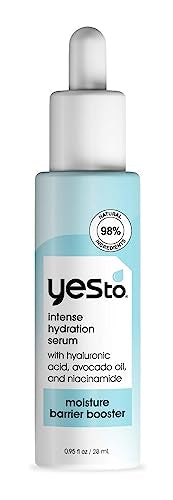
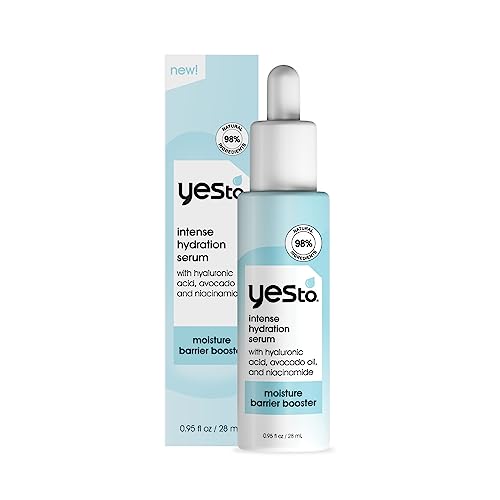
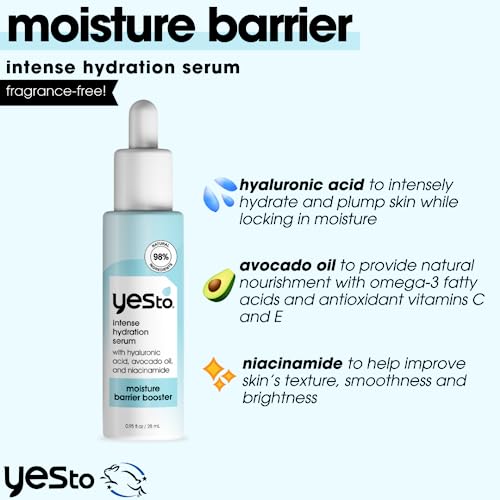
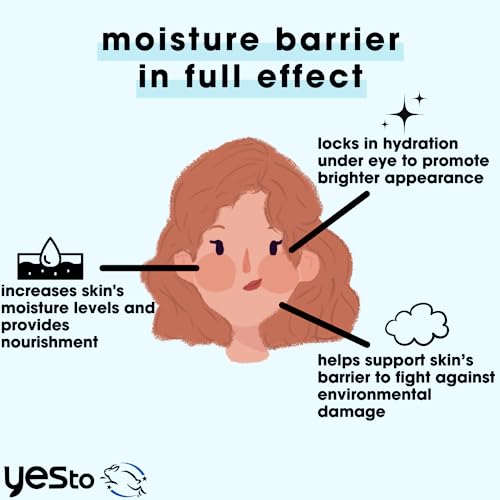
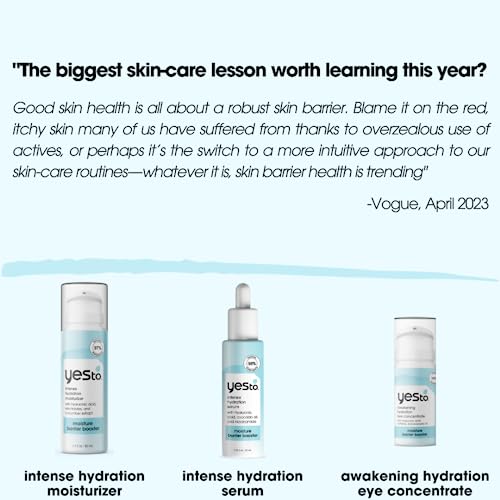
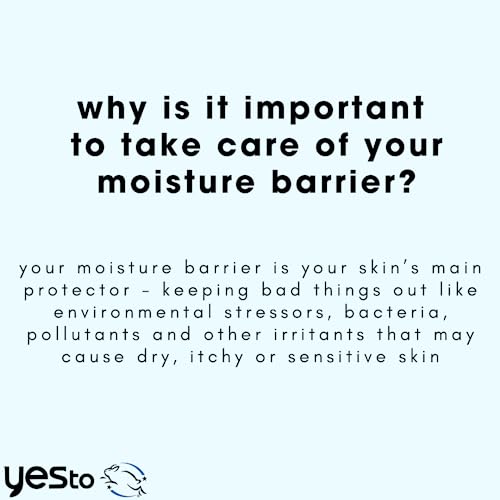
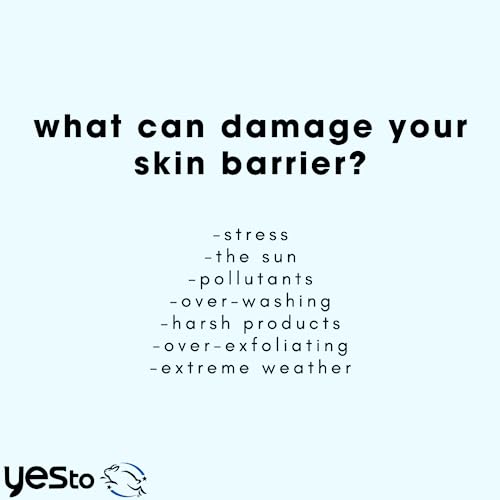
Yes To Face Serum - Intense Hydration, Locks In Moisture, Natural Ingredients - 0.95 Fl Oz


Thuja Occidentalis (Arborvitae)
Medium RiskThuja occidentalis, commonly known as arborvitae, is a coniferous tree native to North America. It is often used in cosmetics and personal care products for its potential antimicrobial properties and as a fragrance component. Its essential oil is extracted for various applications in aromatherapy and traditional medicine.
Sustai Insights
Thuja occidentalis offers functional benefits, including antimicrobial properties and use as a natural fragrance. However, it may pose moderate allergenic risks and is not associated with significant health concerns like carcinogenicity or reproductive toxicity. Regulatory assessments indicate low restrictions on its use. Environmental impacts include potential for irritation and moderate toxicity to aquatic life. Overall, its risk level is categorized as medium, suggesting careful consideration during usage. Alternatives include other plant-based oils with similar benefits but lower allergenic potential.
Phenoxyethanol
Medium RiskPhenoxyethanol is a preservative used in cosmetics and personal care products to prevent microbial growth and extend shelf life. It is commonly found in formulations such as lotions, creams, and serums.
Sustai Insights
Phenoxyethanol serves effectively as a preservative, ensuring product stability and safety by inhibiting microbial growth. It is considered to have low health risks regarding carcinogenicity, allergies, and reproductive toxicity. However, moderate use restrictions exist, and regulatory bodies have advised caution in specific applications. Environmental concerns include its potential as a pollutant, although it is not highly bioaccumulative. Overall, the ingredient presents a medium risk level, with safe usage practices recommended and alternative preservatives available for those seeking greener options.
Ethylhexylglycerin
Low RiskEthylhexylglycerin is a glyceryl ether utilized primarily as a skin-conditioning agent and preservative in cosmetic formulations. It enhances the efficacy of preservatives and serves as a humectant, helping to retain moisture in the skin. This ingredient is commonly found in various personal care products.
Sustai Insights
Ethylhexylglycerin offers functional benefits as an effective preservative and skin-conditioning agent, contributing to product longevity and moisture retention. Health risks are generally low, with minor concerns regarding allergic contact dermatitis and irritant potential. Environmentally, it poses minimal risks, not being recognized as a pollutant or bioaccumulative. Regulatory bodies have imposed few restrictions, indicating its safety for use. Overall, its risk level is assessed as low, making it a viable option in cosmetic formulations. For those seeking alternatives, ingredients like propanediol may serve similar functions with potentially lower irritation profiles.
Vegetarian Glycerin
Low RiskVegetarian glycerin, also known as glycerol, is a colorless, odorless, and viscous liquid derived from plant sources. It is primarily used as a humectant, solvent, and emollient in various personal care products, helping to retain moisture and improve texture.
Sustai Insights
Vegetarian glycerin offers functional benefits as an effective humectant, promoting hydration and skin smoothness. It is biodegradable and typically sustainably sourced. Health risks associated with glycerin are low, with no significant concerns for carcinogenicity, allergens, or reproductive toxicity. Environmental risks are minimal, and it is not subject to major regulatory warnings. Overall, the risk level for this ingredient is low, making it a safe choice in formulations. Safe usage practices include ensuring proper concentrations in products, and alternatives such as propylene glycol exist but may have differing properties.
Phytic Acid
Low RiskPhytic acid is a hexaphosphoric acid ester of inositol, primarily found in seeds, grains, and legumes. It acts as an antioxidant and is often used in cosmetic formulations for its chelating properties, helping to stabilize products by binding metal ions.
Sustai Insights
Phytic acid provides functional benefits such as antioxidant properties and metal ion chelation, enhancing product stability. It is considered environmentally friendly due to its biodegradable nature. Health risks are low, with minimal concerns regarding carcinogenicity, allergies, or reproductive toxicity. Regulatory bodies have imposed minor restrictions, and overall, the risk level is assessed as low. For safe usage, it is important to follow recommended concentrations. Alternatives like ascorbic acid could be considered for similar antioxidant effects.
Water
Low RiskWater is a clear, colorless liquid essential for various biological processes. It serves as a solvent in formulations, facilitating the dissolution of other ingredients and enhancing product texture and application. Additionally, water plays a crucial role in hydration and is a key component in many cosmetic and personal care products.
Sustai Insights
Water is an effective solvent and hydrator, contributing to the texture and efficacy of formulations. It is biodegradable and generally regarded as safe, with low concerns regarding carcinogenicity, allergies, and reproductive toxicity. However, excessive water usage can lead to environmental concerns, particularly regarding resource depletion. Regulatory bodies do not impose restrictions on water use in cosmetics. Overall, the risks associated with water are low, making it a safe and essential ingredient.
Aspalathus Linearis (Rooibos) Leaf Extract
Low RiskAspalathus linearis leaf extract is an extract derived from the leaves of the rooibos plant, commonly used for its antioxidant properties and potential health benefits in cosmetic and personal care products. It is known for its soothing effects and is often included in formulations aimed at sensitive skin.
Sustai Insights
Aspalathus linearis offers functional benefits as an antioxidant and soothing agent, making it suitable for sensitive skin formulations. It is considered sustainable due to its natural sourcing and low environmental impact. Health risks are minimal, with low concerns for carcinogenicity, allergies, and reproductive toxicity. No regulatory restrictions are noted, with overall risk assessed as low. Safe usage practices involve standard application methods, and while alternatives exist, they may not match its specific benefits.
Niacinamide
Low RiskNiacinamide, also known as nicotinamide, is a form of vitamin B3 (niacin) that serves various functions in skincare and cosmetic products. It is often used for its potential benefits in improving skin texture, enhancing moisture retention, and supporting the skin's barrier function.
Sustai Insights
Niacinamide provides functional benefits such as enhancing skin hydration and improving the appearance of uneven skin tone. It is generally recognized as safe, with low concerns regarding carcinogenicity, allergies, or reproductive toxicity. However, enhanced skin absorption may pose risks for sensitive individuals. Regulatory bodies impose few restrictions on its use, and it is considered low risk overall. For safer alternatives, options like panthenol may be considered. Overall, niacinamide is a low-risk ingredient when used appropriately.
Sodium Acetylhyaluronate
Low RiskSodium acetylhyaluronate is a sodium salt derivative of hyaluronic acid, commonly used in cosmetic formulations for its hydrating properties. It functions primarily as a humectant, attracting moisture to the skin and helping to maintain hydration levels in various personal care products.
Sustai Insights
Sodium acetylhyaluronate is recognized for its effective moisture-retaining properties, enhancing skin hydration and improving product texture. It has low health risks, with negligible concerns regarding carcinogenicity, allergies, or reproductive toxicity. Environmentally, it poses minimal risks and is not associated with significant pollution or bioaccumulation. Regulatory assessments indicate no current restrictions. Overall, it is considered low risk, making it a favorable ingredient in cosmetic formulations.
Propanediol
Low RiskPropanediol is a glycol compound commonly used in cosmetic and personal care products as a solvent, humectant, and skin-conditioning agent. It serves to enhance the texture and moisture retention of formulations, contributing to overall product efficacy.
Sustai Insights
Propanediol offers functional benefits such as effective moisture retention and improved product application. It is considered low-risk in terms of health concerns, with minimal associations with carcinogenicity, allergies, or reproductive toxicity. Environmentally, it has low pollutant potential and is not bioaccumulative. Regulatory bodies have not placed restrictions on its use. Despite concerns regarding enhanced skin absorption and potential endocrine disruption, the overall assessment indicates low risk. Safe usage practices should be followed, and alternatives like glycerin or other plant-based humectants can be considered.
Xanthan Gum
Low RiskXanthan gum is a polysaccharide, a sugar-based compound produced by the fermentation of glucose or sucrose. It is commonly used as a thickening agent and stabilizer in various food and cosmetic products due to its ability to improve texture and prevent ingredient separation.
Sustai Insights
Xanthan gum serves effectively as a thickener and stabilizer, enhancing product texture and consistency. It is biodegradable and typically derived from renewable sources, supporting sustainability efforts. Health risks are minimal, with low concerns regarding carcinogenicity, allergies, and reproductive toxicity. Environmental impact is similarly low, posing no significant hazards. Regulatory agencies, including the FDA, regard it as safe for use, with no significant restrictions. Overall, xanthan gum is assessed as low risk, making it a suitable ingredient in formulations.
Chamomilla Recutita (Matricaria) Flower Extract
Low RiskChamomilla recutita (Matricaria) flower extract is derived from the flower of the chamomile plant. It is commonly used in cosmetic products for its soothing properties and as an anti-inflammatory agent. This extract is valued for its potential to calm skin irritations and enhance overall skin appearance.
Sustai Insights
Chamomilla recutita (Matricaria) flower extract is recognized for its soothing and anti-inflammatory benefits, making it effective in skincare formulations. It is sustainably sourced and not associated with significant health risks, such as carcinogenicity or allergenic potential, resulting in a low-risk profile. Environmental concerns are minimal as it does not contribute significantly to pollution. Regulatory bodies impose few restrictions on its use, further supporting its safety. However, users should practice standard safety measures, particularly if they have known sensitivities. Overall, it is a low-risk ingredient with favorable attributes.
Ethylhexylglycerin
Low RiskEthylhexylglycerin is a glyceryl ether utilized primarily as a skin-conditioning agent and preservative in cosmetic formulations. It enhances the efficacy of preservatives and serves as a humectant, helping to retain moisture in the skin. This ingredient is commonly found in various personal care products.
Sustai Insights
Ethylhexylglycerin offers functional benefits as an effective preservative and skin-conditioning agent, contributing to product longevity and moisture retention. Health risks are generally low, with minor concerns regarding allergic contact dermatitis and irritant potential. Environmentally, it poses minimal risks, not being recognized as a pollutant or bioaccumulative. Regulatory bodies have imposed few restrictions, indicating its safety for use. Overall, its risk level is assessed as low, making it a viable option in cosmetic formulations. For those seeking alternatives, ingredients like propanediol may serve similar functions with potentially lower irritation profiles.
Vegetarian Glycerin
Low RiskVegetarian glycerin, also known as glycerol, is a colorless, odorless, and viscous liquid derived from plant sources. It is primarily used as a humectant, solvent, and emollient in various personal care products, helping to retain moisture and improve texture.
Sustai Insights
Vegetarian glycerin offers functional benefits as an effective humectant, promoting hydration and skin smoothness. It is biodegradable and typically sustainably sourced. Health risks associated with glycerin are low, with no significant concerns for carcinogenicity, allergens, or reproductive toxicity. Environmental risks are minimal, and it is not subject to major regulatory warnings. Overall, the risk level for this ingredient is low, making it a safe choice in formulations. Safe usage practices include ensuring proper concentrations in products, and alternatives such as propylene glycol exist but may have differing properties.
Thuja Occidentalis (Arborvitae)
Medium RiskThuja occidentalis, commonly known as arborvitae, is a coniferous tree native to North America. It is often used in cosmetics and personal care products for its potential antimicrobial properties and as a fragrance component. Its essential oil is extracted for various applications in aromatherapy and traditional medicine.
Sustai Insights
Thuja occidentalis offers functional benefits, including antimicrobial properties and use as a natural fragrance. However, it may pose moderate allergenic risks and is not associated with significant health concerns like carcinogenicity or reproductive toxicity. Regulatory assessments indicate low restrictions on its use. Environmental impacts include potential for irritation and moderate toxicity to aquatic life. Overall, its risk level is categorized as medium, suggesting careful consideration during usage. Alternatives include other plant-based oils with similar benefits but lower allergenic potential.
Phytic Acid
Low RiskPhytic acid is a hexaphosphoric acid ester of inositol, primarily found in seeds, grains, and legumes. It acts as an antioxidant and is often used in cosmetic formulations for its chelating properties, helping to stabilize products by binding metal ions.
Sustai Insights
Phytic acid provides functional benefits such as antioxidant properties and metal ion chelation, enhancing product stability. It is considered environmentally friendly due to its biodegradable nature. Health risks are low, with minimal concerns regarding carcinogenicity, allergies, or reproductive toxicity. Regulatory bodies have imposed minor restrictions, and overall, the risk level is assessed as low. For safe usage, it is important to follow recommended concentrations. Alternatives like ascorbic acid could be considered for similar antioxidant effects.
Water
Low RiskWater is a clear, colorless liquid essential for various biological processes. It serves as a solvent in formulations, facilitating the dissolution of other ingredients and enhancing product texture and application. Additionally, water plays a crucial role in hydration and is a key component in many cosmetic and personal care products.
Sustai Insights
Water is an effective solvent and hydrator, contributing to the texture and efficacy of formulations. It is biodegradable and generally regarded as safe, with low concerns regarding carcinogenicity, allergies, and reproductive toxicity. However, excessive water usage can lead to environmental concerns, particularly regarding resource depletion. Regulatory bodies do not impose restrictions on water use in cosmetics. Overall, the risks associated with water are low, making it a safe and essential ingredient.
Aspalathus Linearis (Rooibos) Leaf Extract
Low RiskAspalathus linearis leaf extract is an extract derived from the leaves of the rooibos plant, commonly used for its antioxidant properties and potential health benefits in cosmetic and personal care products. It is known for its soothing effects and is often included in formulations aimed at sensitive skin.
Sustai Insights
Aspalathus linearis offers functional benefits as an antioxidant and soothing agent, making it suitable for sensitive skin formulations. It is considered sustainable due to its natural sourcing and low environmental impact. Health risks are minimal, with low concerns for carcinogenicity, allergies, and reproductive toxicity. No regulatory restrictions are noted, with overall risk assessed as low. Safe usage practices involve standard application methods, and while alternatives exist, they may not match its specific benefits.
Niacinamide
Low RiskNiacinamide, also known as nicotinamide, is a form of vitamin B3 (niacin) that serves various functions in skincare and cosmetic products. It is often used for its potential benefits in improving skin texture, enhancing moisture retention, and supporting the skin's barrier function.
Sustai Insights
Niacinamide provides functional benefits such as enhancing skin hydration and improving the appearance of uneven skin tone. It is generally recognized as safe, with low concerns regarding carcinogenicity, allergies, or reproductive toxicity. However, enhanced skin absorption may pose risks for sensitive individuals. Regulatory bodies impose few restrictions on its use, and it is considered low risk overall. For safer alternatives, options like panthenol may be considered. Overall, niacinamide is a low-risk ingredient when used appropriately.
Phenoxyethanol
Medium RiskPhenoxyethanol is a preservative used in cosmetics and personal care products to prevent microbial growth and extend shelf life. It is commonly found in formulations such as lotions, creams, and serums.
Sustai Insights
Phenoxyethanol serves effectively as a preservative, ensuring product stability and safety by inhibiting microbial growth. It is considered to have low health risks regarding carcinogenicity, allergies, and reproductive toxicity. However, moderate use restrictions exist, and regulatory bodies have advised caution in specific applications. Environmental concerns include its potential as a pollutant, although it is not highly bioaccumulative. Overall, the ingredient presents a medium risk level, with safe usage practices recommended and alternative preservatives available for those seeking greener options.
Sodium Acetylhyaluronate
Low RiskSodium acetylhyaluronate is a sodium salt derivative of hyaluronic acid, commonly used in cosmetic formulations for its hydrating properties. It functions primarily as a humectant, attracting moisture to the skin and helping to maintain hydration levels in various personal care products.
Sustai Insights
Sodium acetylhyaluronate is recognized for its effective moisture-retaining properties, enhancing skin hydration and improving product texture. It has low health risks, with negligible concerns regarding carcinogenicity, allergies, or reproductive toxicity. Environmentally, it poses minimal risks and is not associated with significant pollution or bioaccumulation. Regulatory assessments indicate no current restrictions. Overall, it is considered low risk, making it a favorable ingredient in cosmetic formulations.
Propanediol
Low RiskPropanediol is a glycol compound commonly used in cosmetic and personal care products as a solvent, humectant, and skin-conditioning agent. It serves to enhance the texture and moisture retention of formulations, contributing to overall product efficacy.
Sustai Insights
Propanediol offers functional benefits such as effective moisture retention and improved product application. It is considered low-risk in terms of health concerns, with minimal associations with carcinogenicity, allergies, or reproductive toxicity. Environmentally, it has low pollutant potential and is not bioaccumulative. Regulatory bodies have not placed restrictions on its use. Despite concerns regarding enhanced skin absorption and potential endocrine disruption, the overall assessment indicates low risk. Safe usage practices should be followed, and alternatives like glycerin or other plant-based humectants can be considered.
Xanthan Gum
Low RiskXanthan gum is a polysaccharide, a sugar-based compound produced by the fermentation of glucose or sucrose. It is commonly used as a thickening agent and stabilizer in various food and cosmetic products due to its ability to improve texture and prevent ingredient separation.
Sustai Insights
Xanthan gum serves effectively as a thickener and stabilizer, enhancing product texture and consistency. It is biodegradable and typically derived from renewable sources, supporting sustainability efforts. Health risks are minimal, with low concerns regarding carcinogenicity, allergies, and reproductive toxicity. Environmental impact is similarly low, posing no significant hazards. Regulatory agencies, including the FDA, regard it as safe for use, with no significant restrictions. Overall, xanthan gum is assessed as low risk, making it a suitable ingredient in formulations.
Chamomilla Recutita (Matricaria) Flower Extract
Low RiskChamomilla recutita (Matricaria) flower extract is derived from the flower of the chamomile plant. It is commonly used in cosmetic products for its soothing properties and as an anti-inflammatory agent. This extract is valued for its potential to calm skin irritations and enhance overall skin appearance.
Sustai Insights
Chamomilla recutita (Matricaria) flower extract is recognized for its soothing and anti-inflammatory benefits, making it effective in skincare formulations. It is sustainably sourced and not associated with significant health risks, such as carcinogenicity or allergenic potential, resulting in a low-risk profile. Environmental concerns are minimal as it does not contribute significantly to pollution. Regulatory bodies impose few restrictions on its use, further supporting its safety. However, users should practice standard safety measures, particularly if they have known sensitivities. Overall, it is a low-risk ingredient with favorable attributes.
Discover the hydrating power of Yes To Intense Hydration Serum, designed to lock in moisture and support your skin's natural barrier. This lightweight, dermatologist-tested serum is your go-to solution for achieving healthy, radiant skin.
- Boosts Moisture Barrier: Infused with 1% Hyaluronic Acid, this serum enhances hydration levels and fortifies your skin against environmental stressors.
- Gentle for All Skin Types: Suitable for every skin type, this fragrance-free formula combines Avocado Oil and Chamomile Extract for soothing nourishment.
- Nutrient-Rich Ingredients: Packed with Niacinamide and essential vitamins, this serum helps maintain moisture while protecting your skin's integrity.
- Easy Application: Just 2-3 drops applied to clean skin before your moisturizer provide maximum hydration and absorption.
- Vegan & Cruelty-Free: Committed to sustainability, this serum is made from natural ingredients and is free from animal testing, aligning with eco-conscious values.
Subscribe & Save with Sustai
- Best Price Guarantee: Always enjoy the lowest prices on sustainable home essentials.
- No Surprises: We’ll notify you before shipping. No hidden fees, ever.
- You’re in Charge: Change, pause, or cancel your subscription anytime with ease.
- Eco-Friendly Deliveries: Our grouped shipments mean less packaging and lower emissions.
Join us on a sustainable journey. Special offers for a limited time! Prices and promotions may change.
Recommended Products
Discover the hydrating power of Yes To Intense Hydration Serum, designed to lock in moisture and support your skin's natural barrier. This lightweight, dermatologist-tested serum is your go-to solution for achieving healthy, radiant skin.
- Boosts Moisture Barrier: Infused with 1% Hyaluronic Acid, this serum enhances hydration levels and fortifies your skin against environmental stressors.
- Gentle for All Skin Types: Suitable for every skin type, this fragrance-free formula combines Avocado Oil and Chamomile Extract for soothing nourishment.
- Nutrient-Rich Ingredients: Packed with Niacinamide and essential vitamins, this serum helps maintain moisture while protecting your skin's integrity.
- Easy Application: Just 2-3 drops applied to clean skin before your moisturizer provide maximum hydration and absorption.
- Vegan & Cruelty-Free: Committed to sustainability, this serum is made from natural ingredients and is free from animal testing, aligning with eco-conscious values.

You can have at most 2 Sustainable Steals products in your cart
Customer Reviews
Customers’ View
Customers generally express satisfaction with the Hydrating Face Serum, highlighting its effectiveness in providing hydration and supporting skin health. Many users appreciate its lightweight texture, noting that it absorbs quickly and leaves the skin feeling soft and smooth. Positive feedback often emphasizes the serum's compatibility with various skin types, particularly for those with dry or sensitive skin. Some reviewers specifically mention its benefits during winter, stating it helps combat dryness effectively. However, there are concerns regarding the product's packaging, as multiple customers reported issues with the pump, affecting their ability to dispense the serum. Overall, while the serum is recognized for its hydrating properties and skin barrier support, improvements in packaging design could enhance the user experience.
AI-generated from the text of customer reviewsThis product is rated 5.0 of 5.0 stars.
It has received 1 review.




